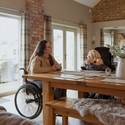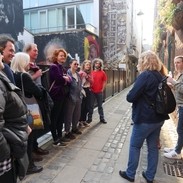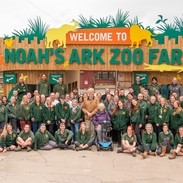National Accessible Scheme update
Photo by: VisitBritain

Section 1
February 2023
In support of the Government’s ambition for the UK to become the most accessible tourism destination in Europe, we commissioned Tomorrow’s Tourism to undertake a full and independent review of the National Accessible Scheme (NAS)
The NAS was established in 1993 to help disabled travellers identify suitable accommodation more easily. The scheme awards a venue’s suitability for people with accessibility requirements. These are in common groupings, such as older and less-mobile guests-assisted wheelchair users, or people visual impairment.
The review was undertaken by 673 people with health conditions / people who travel with others with health conditions.
Key findings
National Accessible Scheme Consumer Research report
The key findings showed NAS no longer reflects traveller preferences and behaviours around trip-planning.
Next steps
NAS closure
In line with the review’s recommendation, NAS has closed to new participants and will cease on 31 July 2025. We are committed to updating and enhancing our initiatives to best serve the current information needs of travellers with accessibility requirements and the guidance needs of the tourism industry.
Key findings of the review
The review, overseen by VisitBritain’s Ross Calladine, Disability and Access Ambassador for Tourism, highlighted key findings on the requirements of today’s disabled travellers, which are not being met by the NAS or similar schemes
- Features, not disability: NAS groups people into impairment categories, prescribing suitable accommodation to the customer on their behalf. This contrasts to most holiday-makers, who think about accommodation features, rather than disability categories.
- Assumptive ratings: Ratings based on impairment type are assumptive and do not provide enough information for individual decision-making. This means disabled travellers have to undertake their own research into specific facilities of the accommodation. In the words of one interviewee: “Don’t tell me what I want, tell me what you have and I’ll make my decision.”
- The scope of disability is vast: Each individual’s requirements are unique and people with the same impairments often have different accessibility needs. The average trip party in this audience also has two or three different conditions and differing impairments can often lead to opposing requirements. NAS cannot cater for such multi-faceted considerations.
- Destinations: Accommodation is only one element of the decision-making process when people with accessibility requirements book trips. The wider destination’s accessibility is as, or more, important. A more holistic approach to providing information on the public realm, visitor attractions and food and drink venues is required.
- Technology: The tourism landscape is very different compared to when the NAS was launched in 1993. Technology, consumer behaviour and visitor expectations have all changed and NAS no longer reflects traveller preferences and behaviours of its target audience.
- Format: The review emphasised today’s traveller wants venues to be described factually to empower them to make personal choices on suitability. Therefore, a format like Accessibility Guides is a better solution than the NAS to serve the information needs of travellers with accessibility requirements.
- Tourism businesses: Although the technical standards within the NAS are seen by businesses as a toolkit to develop facilities, the format and presentation are perceived as too complicated. This is off-putting for many tourism businesses, who do not engage with the guidance.
- Staff and information: The review emphasised the limitations of the NAS as a practical business development tool because of its focus on facilities and buildings, underplaying the more critical role of staff training and information provision – the other pillars in accessible tourism.
What we are doing
Following the findings, work is underway to update our resources and better equip tourism businesses with the accessibility tools they need. Here are the measures we are taking:
New Accessibility Guides
Understanding that accessibility information is a key barrier to disabled people travelling we created Accessibility Guides (formerly Access Statements). A standard approach for tourism venues to provide accessibility information, it includes a template tool for businesses to produce their own Accessibility Guides.
We are now developing the next phase of Accessibility Guides to allow all businesses, not just accommodation ones, to accurately describe their venue in detail, including photos and video. These initiatives will further empower disabled travellers and help tourism businesses develop experiences people with a wide range of accessibility requirements can enjoy – further growing the £15.3bn accessible tourism market.
New accessible tourism toolkits
Work is underway on new accessible tourism toolkits. These toolkits, created by Access & Inclusion UK and Mima, will inspire, inform and guide tourism businesses and Local Visitor Economy Partnerships (LVEPs) in England, through practical tips and case studies.
The business toolkit will cover the three pillars of accessibility - facilities, information and customer service- plus information on employing disabled people. It will include updated national accessible tourism standards for the built environment. The toolkit will be available on the VisitEngland Business Advice Hub mid-2023.
Inclusive VisitEngland quality assessments
Accessibility will become a core element of the business advice provided by quality scheme assessors. Using the accessible tourism toolkit, assessors will provide guidance to all scheme participants to help them develop their accessibility. That compares with the current advisory level of only 4% of accommodation scheme participants, through the NAS.
Introduction of accessibility features question set
We will also deliver an ‘top accessibility features’ question set for businesses. This will create a consistent approach to venue accessibility information, enabling online travel agents and other distribution websites to include it. VisitEngland quality scheme participants will be able to display their top accessibility features, including a link to their Accessibility Guide, on their AA Rated Trips listing.







